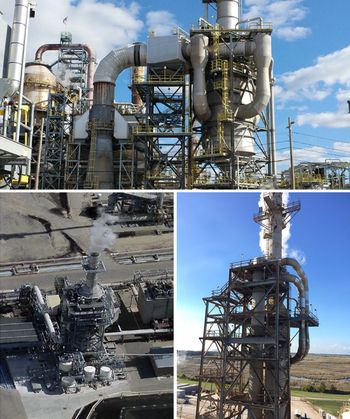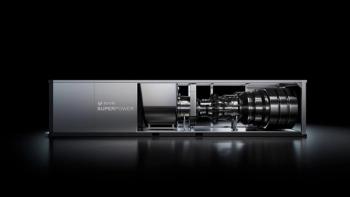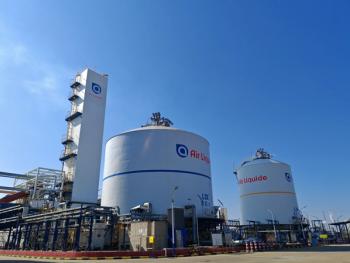
- May/June 2021
The effect of eddy grooves on tilting pad journal bearings
Tilting pad journal bearings are used in turbocompressors, turbo gears, gas turbines, and steam turbines.
Tilting pad journal bearings are used in rotating equipment such as turbocompressors, turbo gears, gas turbines, and steam turbines. The development trends for these applications create a growing demand for bearings with increased load carrying capacity or increased power density. This goal must be achieved without an impairment of bearing functionality or operational reliability.
Conventional bearings have performance limits that can be reached or exceeded in turbomachinery applications due to different reasons. To overcome traditional operational limits, it is often necessary to reduce the oil film temperatures. Several design optimizations are known.
By disturbing the laminar flow regime with grooves, the flow is locally converted from laminar to turbulent. The radial flow components of turbulence improve heat exchange between high temperature loads and cooler areas.
A prerequisite for the safe and reliable operation of bearings is sufficient lubricant film thickness, which basically depends on the occurring load, speed, and the selected lubricant. Another important parameter to monitor is heat generated in the oil. Improved bearing performance takes into consideration the maximum temperatures of the lubricant and the bearing. Even at high speeds and loads, the right design avoids excessive heating of parts of the bearing as well as hot spots in the oil film.
To increase heat dissipation, it is common to use features like directed lubrication and pad base materials with high thermal conductivity. If this approach is insufficient, there are geometric options like an increase of the axial length or the bore diameter of the bearing. Such changes could raise oil demand, power losses, and space requirements. In some cases, geometric modifications of bearings in operation in turbomachinery are not feasible.
Eddy Grooves
A major cause of high local bearing temperatures and low heat dissipation is the laminar flow regime of the lubricating oil i.e., the lack of radial flow velocities in combination with low thermal conductivity of the medium. Eddy groove technology is a way to solve such heat dissipation issues. By disturbing the laminar flow regime with grooves, the flow is locally converted from laminar to turbulent. The radial flow components of turbulence improve heat exchange between high temperature loads and cooler areas. This makes it possible to push performance limits upwards without changing the general bearing or housing design while maintaining or improving reliability and operational safety.
An article discussed the performance improvement gained from eddy grooves (published in 2021, written by Schüler E, Berner O.) on a 5-tilting pad journal bearing with a bore diameter of 120 mm at a speed range of 50 – 110 m/s and a load range of 0 – 4 MPa. Temperature sensors close to the sliding surface determined maximum temperatures. Tests confirmed a significant surface temperature reduction.
To date, the technology has been experimentally verified on bearings with shaft diameter of 120 and 500 mm. In addition, the first 60 mm diameter eddy groove tilting pad bearing was installed in January 2021 in an integrally geared compressor. The machine is operating and its former bearing temperature problems have been resolved.
In summary, eddy groove technology can be beneficial for highly loaded bearings that operate near their performance limits as a means of increasing the reliability and availability of turbomachinery. In some cases, reduced maximum temperatures may also allow a reduction in bearing size, which would lead to lower oil demand and reduced power losses of the bearing, while keeping temperatures at an acceptable level. ■
Stephan Faulhaber is Technical Manager at Miba Industrial Bearings Germany, a company based in Göttingen, Germany that manufactures tilting pad journal bearings including the Miba Eddy Groove technology. For more information, visit miba.com/industrialbearings
Eckhard Schueler is a Senior R&D Engineer at Miba. He is the co-author of a paper on eddy grooves (Schüler, E.; Berner, O. Improvement of Tilting-Pad Journal Bearing Operating Characteristics by Application of Eddy Grooves. Lubricants 2021, 9, 18. https://doi.org/10.3390/lubricants9020018)
Articles in this issue
over 4 years ago
Piping and Nozzle Loadsover 4 years ago
Bearings and stabilityover 4 years ago
Options for Modernizing Steam Turbinesover 4 years ago
Myth: Additive Manufacturing is the Answer for Everythingover 4 years ago
Turboexpander reliability has increased steadily over timeover 4 years ago
Vendor spotlight: Elliott Groupover 4 years ago
Fog system upgradesover 4 years ago
Turboexpander reliability has increased steadily over the yearsover 4 years ago
Sundyne aligns with net zero goalsNewsletter
Power your knowledge with the latest in turbine technology, engineering advances, and energy solutions—subscribe to Turbomachinery International today.




